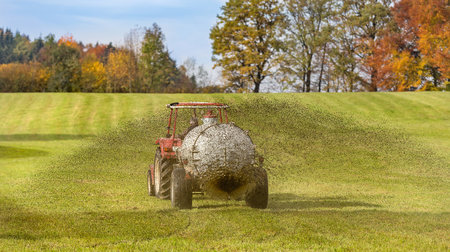
About Clean Air Farming
Clean Air Farming has a vision of food production without the negative effects of excessive ammonia and methane emissions. We are committed to a long-term reduction of air pollution from animal husbandry. This requires a more consistent implementation of, and improvements to, the current legal framework.
We aim to promote the use of reduction techniques and the capacity within the agricultural and food industries to reduce ammonia and methane emissions. We also focus on combating food waste to reduce the impact of unnecessary production.
Our project team consists of the four partners France Nature Environment, European Environmental Bureau (EEB), Lake Constance Foundation and Deutsche Umwelthilfe. Together, we develop solutions with actors from agriculture, the food sector and politics. The core area of the project activities lies in Germany and France. Through the participation of the EEB, the project aims to transfer results across Europe, in order to place them in at least five other EU countries. The project runs from August 2018 to January 2022 and is co-financed by the EU LIFE program.
Reducing Ammonia and Methane Emissions from Agriculture to Improve Air Quality and Climate Protection
Ammonia (NH3) and methane (CH4) emissions have a negative impact on human health, climate and ecosystems. Methane is a greenhouse gas and is also a precursor gas for harmful ground-level ozone (O3). Ammonia, on the other hand, reacts with other air pollutants to form particulate matter and may cause asthma, chronic lung diseases, cardiovascular diseases and diabetes. According to the European Environment Agency, more than 60,000 people in Germany die prematurely each year from the increased concentration of particulate matter (PM2.5) and 3,000 as a result of ozone.
In addition, ammonia is spread by air and leads to acidification and eutrophication of near-natural ecosystems and thus to a loss of biological diversity. Already 63% of European ecosystems and 73% of NATURA 2000 sites are seriously affected by air pollution.
In Europe, agriculture is responsible for over 50% of methane emissions and about 90% of ammonia emissions. The most important sources of methane are emissions from fermentation during the animal digestion process of ruminants and emissions from the storage of solid manure, slurry and fermentation residues. Ammonia is emitted during the application of urea-based mineral fertilisers and is also produced during the storage and application of manure from pig, cattle and poultry farming. Agricultural production processes, especially in the area of dairy and meat production, therefore offer numerous starting points for an effective reduction of methane and ammonia emissions.
Clean Air Farming addresses the biggest challenges in implementing measures to reduce ammonia and methane emissions from agriculture. Our focus is on the consideration and integration of existing knowledge in legislative procedures and in practice, as well as the implementation of existing legal provisions. With regard to methane, there are no concrete statutory obligations to reduce emissions in the agricultural sector. For ammonia, the National Emissions Ceilings (NEC Directive) specifies annual maximum quantities. Germany has been exceeding these limits for a number of years. In the future agricultural policy must force the introduction of emission-reducing practices.
Clean Air Farming has four main objectives
- Raising awareness among meat and dairy industry associations and food sector operators and developing a common position
- Involvement of civil society organisations in legislative processes and in the implementation of national air pollution control programmes (NAPCPs)
- Improving the curriculum of agricultural vocational training to inform future farmers about the impact of their own actions and to provide practical tools to prevent emissions.
- Reduce food waste from meat and dairy products along the supply chain to increase overall resource efficiency in food production and reduce absolute emissions of methane and ammonia.

Activities and results
- At round tables, associations of the meat and milk producing industry and actors of the food sector discuss methods and their harmonisation for the reduction of methane and ammonia and identify necessary political framework conditions and incentives.
- In addition, food companies are motivated to set effective and verifiable criteria with regard to ammonia and methane for suppliers and certified companies. Written recommendations for the revision of existing labels and standards in meat and milk production are communicated to companies and organisations.
- Throughout Europe we coordinate the participation of civil society organisations in the implementation and revision of the relevant guidelines and programmes. This includes the implementation of the NEC Directive, in particular the development of the National Air Pollution Control Programmes in Germany and France. In addition, we are pushing for a new Common Agricultural Policy (CAP) that promotes and calls for emission-reduced agriculture in the European Union. The revision of the Gothenburg Protocol at international level is being accompanied by the aim of extending it to methane.
- The participation of civil society organisations includes participation in public participation processes, media relations and position papers.
- In France, we promote the necessary discourse between the actors to harmonise the different policies in the field of air pollution control and the viable implementation of the National Plan for the Reduction of Air Pollutant Emissions (PREPA).
- Ammonia and methane reduction should be increasingly integrated into agricultural vocational training. To this end, vocational schools and universities, chambers of agriculture, institutes, associations and vocational schools in Germany will be addressed in a survey and in discussions with experts. Suggestions for improvements are developed together with those responsible at the chambers of agriculture.
- With the help of petitions and technical discussions, legal drawbacks are addressed that enable and fuel food waste.
- Intensive press and public relations work further raises awareness of food waste in society and informs media representatives.

